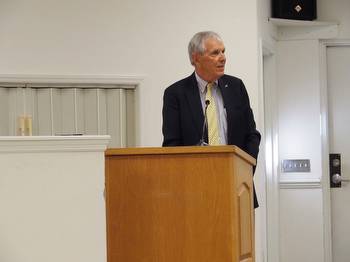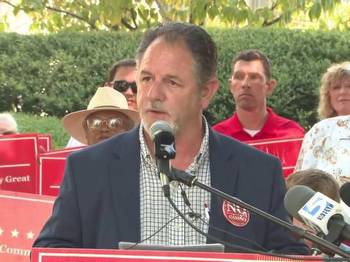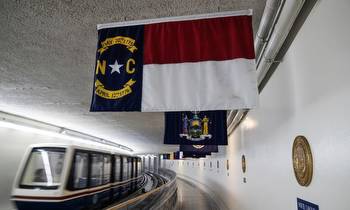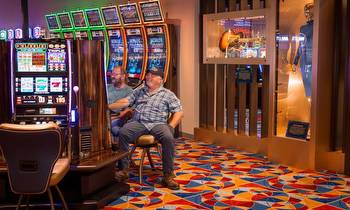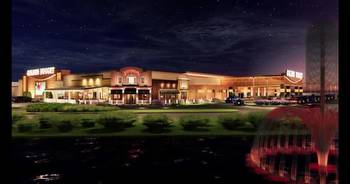Casino bad idea for Rockingham County, residents say

ROCKINGHAM COUNTY — Residents here say they are worried about a move afoot in Raleigh to expand gaming in the rural county that comes at the same time an investor linked with casino development has requested commercial zoning of a large parcel of land along U.S. 220 near Madison in the Huntsville Township.
N.C. Development Holdings Co., which has ties to Baltimore-based The Cordish Companies, a major national developer of branded casinos and entertainment districts, is seeking highway/commercial rezoning of nearly 200 acres of property currently zoned as residential/agricultural.
Those links to the casino developer are outlined in filings last month by N.C. Development Holdings with the North Carolina Secretary of State’s Office, records show.
And the prospective developer is poised to lobby the Rockingham County Board of Commissioners for the change at its Aug. 21 meeting, the next step for the applicant since the Rockingham County Planning Board voted 5-2 during a hearing last week against recommending the change to commissioners. The board’s chairman Paul Ksieniewicz and vice-chair Julie Talbert, both of Eden, voted to approve the rezoning request.
Commissioners hold the power to green-light rezoning, despite the board’s vote against it.
The developer’s representative, Will Quick, an attorney with Brooks Pierce law firm in Raleigh, appeared at the July 10 planning board hearing but shared no details about how his client plans to develop the massive parcel, located about 25 miles north of Greensboro.
The July 10 meeting was packed with Huntsville residents who live near the land and who disagree strongly with rezoning the bucolic span of farmland that is adjacent on its south side to Camp Carefree.
The sleep-away camp is one of the state’s only cost-free facilities with medical care for children suffering from complex diseases, such as spina bifida, cancers, epilepsy and hemophilia.
Opponents of the rezoning have garnered more than 350 petition signatures against the move at change.org since July 13.
Meanwhile, Senate leader Phil Berger, the county’s representative in the General Assembly, is in discussions with other state GOP leaders about "options for expanding gaming in North Carolina,'' said Lauren Horsch, Deputy Chief of Staff for Communications in Berger's Raleigh office.
"There is no formal proposal yet, there are only discussions about options for expanding gaming in North Carolina,'' Horsch said via email Tuesday afternoon. "The Senate and House are still negotiating, and a final budget – with or without expanded gaming – has not been considered.''
If the issue does become attached to the state budget and approved, casino gambling could become legal in Rockingham, Anson and Nash counties.
Indeed, Berger, a Republican, last week told the Associated Press he is optimistic that a change in the law to allow casinos on non-tribal land in the three counties stands better than a “50-50 chance” of making it to the desk of Democratic Governor Roy Cooper before summer’s end.
Furthermore, House Speaker Tim Moore (R-Cleveland) recently told reporters that legislators are considering authorizing four “entertainment districts” that could include casinos. He stopped short of describing locations for the developments.
The discussions about gaming expansion in North Carolina come as slot machines chime some 30 miles north of Rockingham County in bordering Danville, Va., at the new Caesars Virginia casino, which opened doors to its temporary facility to overflow crowds in mid-May.
Since then, the casino has generated $31 million in gaming revenue and roughly $2.5 million in tax relief for the city of Danville, according to a Virginia Lottery gaming activity report.
And Berger, who maintains a home in Eden, told The Associated Press last week that he had recently traveled to the Danville casino where he estimated 80% of cars in the parking lot bore N.C. license plates.
Berger’s observation dovetails with findings of a conservative Mooresville-based group called Greater Carolina, which commissioned a January study by Spectrum Gaming Group that looked at the economic impact of launching three free-standing resort casinos in Rockingham, Anson and Nash counties.
The study, released in March, concluded casinos in the three counties would annually generate gross gaming revenue in excess of $1.6 billion, Spectrum report summaries show.
Without new casinos, North Carolina could lose money to neighboring states’ casinos to the tune of $259 million in gaming revenue annually, the Spectrum study concluded.
North Carolina is already home to three casinos — two Eastern Band of Cherokee Indian casinos located in the far-western part of the state and a Catawba Indian casino on Interstate 85 near the South Carolina border.
Possibility of casinos a big surprise to locals
The proposed broadening of state gaming law has come as a surprise to many in the county of 91,000, residents said this week.
An informal poll of 100 adult county residents this week found that just two had heard about plans to change casino legislation.
The lack of information is frustrating to residents and to those wanting to protect Camp Carefree, residents said.
“Nobody knows who’s involved (in N.C. Development Holdings, Inc.)’’ said Kitty Williams of Madison, who argued before the planning board that the land along U.S. 220 should remain zoned residential/agricultural.
Williams said sick children who find respite annually at the camp need their sanctuary to remain unsullied by large commercial development, noise and traffic next door.
“This is very suspicious,’’ she said of the rezoning request, which does not propose any specific commercial project. “This is a huge piece of property. ... This is weird, and not knowing what it’s to be used for .... very strange.’’
While Quick did not disclose to the board what type of business N.C. Development Holdings seeks to launch at the site, he did tell members his client has plenty of experience developing such large commercial properties.
Such projects are “not new to me or the client I represent,’’ Quick said.
Camp supporters: Legislators have lost sight of community
A veteran nurse and sister of Camp Carefree’s former executive director said she is disappointed in legislators’ interest in introducing casinos to the county.
“Sen. Berger may have served this county when originally elected, but to me, he and his colleagues, have stopped serving the voters,’’ said Anne Tuttle, whose late sister Lynn Tuttle headed the 37-year-old camp for nearly a decade.
“They have prostituted their offices for out-of-state monies, proven the need for term limits and shown their lack of integrity,’’ Tuttle said.
“The county commissioners — one of whom is Sen. Berger’s son, Kevin Berger — have pushed for a casino in front of a camp that has been supported by churches and local businesses for years,’’ Tuttle said.
Neither Phil Berger Sr. or Kevin Berger could be reached immediately for comment.
“I am sure commissioners will shrug and say it isn’t against the law, but that reveals their lack of commitment to community and their lack of personal ethics,’’ Tuttle said. “Someone should see where the money trail leads.’’
Advocates: Protect sick children’s sanctuary
Camp Carefree board member and treasurer Rhonda Rodenbough, who lives on the grounds of the camp, told the planning board that commercial development near the serene camp would kill its charm and purpose.
Each year she sees hundreds of kids with debilitating chronic diseases get the chance to enjoy a rustic camp with other sick youngsters, shifting focus away from their pain and disabilities.
Rezoning would be “very damaging to Camp Carefree,’’ Rodenbough said of the nonprofit facility that draws volunteer medical personnel from across the state to care for chronically ill kids, ages 6-16.
Allowing it would be like writing developers a “blank check,’’ she said. “We’re asking you to protect a sanctuary that hundreds of kids have for one week to just be a kid.’’
B.J. Rierson, who lives on Carlton Road near the camp, said through tears that such development would be “destroying our lives.’’
“(Camp Carefree) kids want to see cows and horses in the field,’’ Rierson said. “They don’t want to see concrete. I think you know what they (developers) want to put there, make a lot of money and leave. And none of the neighbors want it. Don’t tell us it’s not affecting us.’’
Wendy Forbes, a resident of Dogwood Acres Lane, less than a mile from the camp, echoed Rierson’s concerns, saying she moved to the area from Greensboro to “get away from all the city life.”
Campers “really deserve to keep the serenity they’ve got over there for the kids,’’ Forbes told the planning board.
Faith groups speak out
As Rockingham Countians prepare their response to the specter of big development by a casino, the state’s faith community is speaking out against gaming expansion that would allow more casinos.
The Christian Action League of North Carolina posted an article on its website this week denouncing the plan and directed readers to contact their legislators and oppose gaming expansion.
The Rev. Mark Creech, executive director of the CAL, said legalizing such casinos was predatory and could devastate the vulnerable poor in rural communities.
“Gambling is an enterprise which allows one segment of our citizens to exploit and even enslave another via addiction for the purpose of financial gain,’’ Creech said in a news article by the CAL posted on the organization’s home page.
“Plus, I would suggest the enterprise violates the rights and freedoms of two-thirds of the public who almost never gamble yet are forced to foot the bill for the lower standard of living that gambling always leaves in its wake,’’ Creech said in the article.
To counter an argument by casino proponents who call gambling a matter of personal choice and freedom, Creech said, “Governments exist to protect the wider public interest and intervene in areas where individual actions may have negative consequences on society as a whole.’’
In a further move against gaming expansion, the American Family Association fired off emails to Tar Heel constituents this week to say that the move can “exacerbate economic inequality,’’ drawing in low income individuals who cannot afford to gamble.
The expansion would contribute to social problems, including domestic violance and suicide, as well, the group said in its email blast.
The Tupelo, Miss.-based AFA bills itself as “a conservative and Christian fundamentalist 501 organization’’ with a mission to support the church and “to inform, equip, and activate individuals and families to transform American culture ...’’
Perhaps the most troubling thing to a good number of Rockingham County residents is the feeling they’ve been excluded from the decision-making process when it comes to allowing casinos.
“Most people in Rockingham County don’t know about this,’’ Williams of Madison told the planning board.
“Why are we just hearing about this now as it’s getting ready to go into the state budget and possibly be drafted into law?’’ Tuttle said. “Our legislators should have asked for our input.’’











